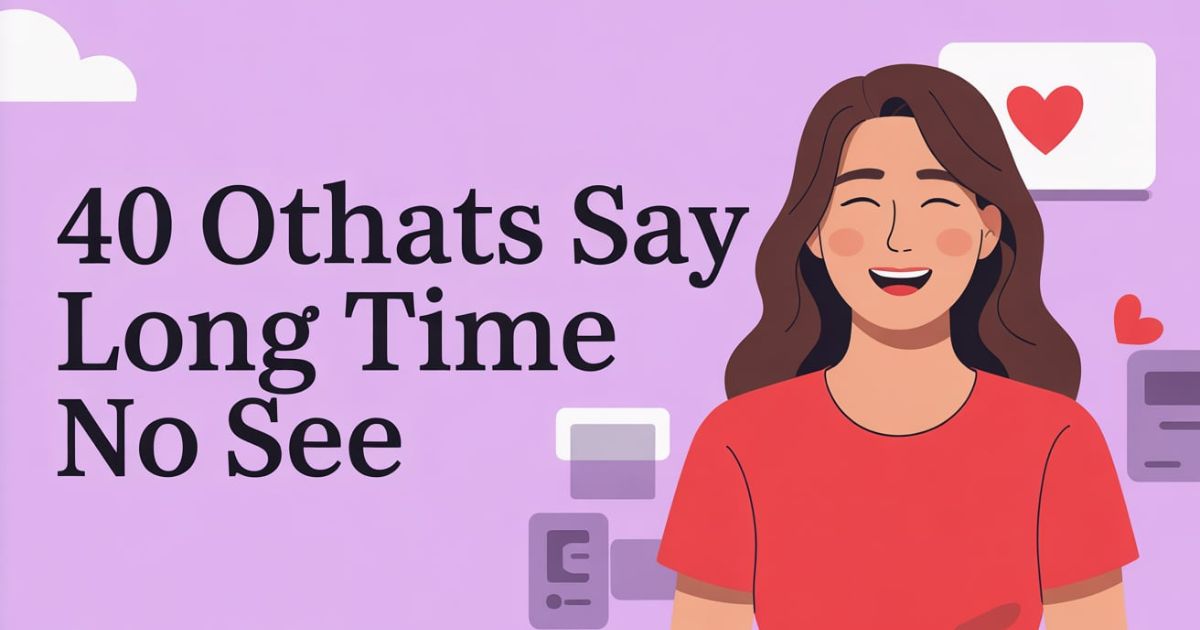Ever run into an old friend and instantly blurt out, “Long Time No See!”? This phrase brings instant warmth, surprise, and nostalgia. But did you know there are plenty of ways to say it differently? A long time no see other term could be “It’s been ages” or “It’s been a while.” Looking for a long time no see synonym? Try “Nice to see you again!”
In the digital world, people often say “long time no chat” when reconnecting online. Whether you’re catching up with an old friend or engaging in business networking, the right words set the tone. Long Time No See is friendly and familiar, but there are more polished or playful alternatives. Want to add variety to your greetings? Let’s explore creative ways to say Long Time No See!
What Does “Long Time No See” Mean?
Long Time No See is a common phrase used when reconnecting with someone after a long gap. It expresses excitement, surprise, and happiness in a friendly way. The phrase is informal and often used in casual conversations. You might say Long Time No See when running into an old friend, colleague, or even a distant relative. It’s a simple yet warm way to acknowledge the time that has passed since your last meeting.
Though widely used, Long Time No See is not grammatically correct. It likely originated from broken English spoken by non-native speakers, but over time, it became a common expression. Many people prefer a Long Time No See synonym like “It’s been ages” or “Nice to see you again.” If chatting online, some say Long Time No Chat instead. Whether in person or online, this phrase helps strengthen personal and professional relationships through warm communication.
Is It Professional/Polite to Say “Long Time No See”?

Long Time No See is a friendly phrase, but is it professional? In casual settings, it works well for reconnecting with colleagues or clients. However, in formal business communication, a more polished phrase is better. Saying “It’s been a while” or “Nice to see you again” sounds more professional. While Long Time No See isn’t rude, some may find it too informal for workplace conversations.
In emails or meetings, choosing a polite alternative shows professionalism. A phrase like “I hope you’ve been doing well” or “Great to reconnect” keeps the tone respectful. If you’re unsure, consider the relationship and setting. Long Time No See is perfect for friendly chats but may not fit in serious business discussions. Using a Long Time No See other term like “It’s been some time” ensures politeness. In professional spaces, balance warmth with respect when greeting someone after a long time.
Advantages and Disadvantages of Using “Long Time No See”
Long Time No See is a popular phrase, but it has pros and cons. It’s warm, friendly, and great for casual conversations. It makes reconnecting feel natural and joyful. However, it may sound too informal in professional settings. Some might see it as outdated or grammatically incorrect. Choosing the right greeting depends on the situation and the person you’re speaking with.
Advantages:
- Creates a friendly and warm atmosphere
- Easy to use in casual conversations
- Expresses joy in reconnecting with someone
- Works well in social and informal settings
- Recognized and understood globally
Disadvantages:
- Sounds too informal for professional conversations
- Some may find it grammatically incorrect
- Not suitable for serious or formal emails
- Can feel outdated to some people
- Lacks variety compared to other greeting options
Synonyms for “Long Time No See”
- It’s been a while
- It’s been ages
- It’s been too long
- Nice to see you again
- Good to see you
- Glad to see you again
- We haven’t met in forever
- It’s been forever
- Haven’t seen you in a long time
- It’s been some time
- Look who’s here
- Wow, it’s been a long time
- Fancy seeing you here
- Long time, no talk
- Hey, stranger
- Where have you been
- It’s great to see you again
- What a surprise to see you
- We meet again
- It’s been so long
- After all this time
- Good running into you
- What a pleasant surprise
- Hey, it’s been a while
- It’s been too long since we last met
- How long has it been
- I can’t believe it’s you
- So good to see you
- Been ages since I saw you
- I haven’t seen you in forever
- Long time, no chat
- It’s been a long road
- Been missing you
- Hard to believe it’s been so long
- Well, look who it is
1. It’s been a while
Meaning: A simple way to acknowledge time passing since last meeting.
Definition: Expresses that a significant amount of time has passed.
Explanation: Suitable for both casual and professional settings.
Example: “It’s been a while since we last caught up. How have you been?”
Best Use: Works in friendly and semi-formal conversations.
Tone: Neutral and warm.
2. It’s been ages
Meaning: A slightly exaggerated way to express a long time apart.
Definition: Highlights the extended time in a humorous way.
Explanation: Used among friends to express surprise or excitement.
Example: “It’s been ages since we met! Let’s catch up soon.”
Best Use: Great for friendly and casual interactions.
Tone: Lighthearted and enthusiastic.
3. So good to see you again
Meaning: A heartfelt way to express joy when meeting someone.
Definition: Shows genuine happiness in reconnecting.
Explanation: Works well in both personal and professional relationships.
Example: “So good to see you again! How have things been?”
Best Use: Ideal for warm and positive reunions.
Tone: Friendly and sincere.
4. How have you been?
Meaning: A common question after not seeing someone for a while.
Definition: Shows interest in someone’s well-being.
Explanation: Suitable for both social and workplace interactions.
Example: “How have you been? It’s been a long time!”
Best Use: Can be used in any setting.
Tone: Caring and conversational.
5. Look who it is!
Meaning: A playful way to acknowledge someone’s presence after a long time.
Definition: Used to express surprise and excitement.
Explanation: Works well in casual and lighthearted conversations.
Example: “Look who it is! I haven’t seen you in forever.”
Best Use: Best for informal and fun interactions.
Tone: Playful and enthusiastic.
Read Also: 45 Other Ways to Say ‘Sorry to Bother You’ (With Examples)
6. Nice to see you after so long

Meaning: A warm way to reconnect with someone.
Definition: Expresses happiness in meeting again after a long time.
Explanation: Can be used in both personal and professional settings.
Example: “Nice to see you after so long! Let’s catch up.”
Best Use: Works in formal and informal conversations.
Tone: Friendly and warm.
7. It’s been too long
Meaning: Expresses that too much time has passed since the last meeting.
Definition: A nostalgic way to highlight a long gap in communication.
Explanation: Often used when reuniting with close friends.
Example: “It’s been too long! We need to meet more often.”
Best Use: Best for catching up with old friends.
Tone: Warm and personal.
8. It’s been forever!
Meaning: An exaggerated way to express a long separation.
Definition: A dramatic and playful way to acknowledge time apart.
Explanation: Works best with friends and acquaintances.
Example: “It’s been forever! What have you been up to?”
Best Use: Perfect for social interactions.
Tone: Casual and excited.
9. It’s a pleasure to reconnect
Meaning: A polite way to acknowledge meeting someone again.
Definition: Expresses appreciation for reconnecting.
Explanation: Ideal for professional and formal conversations.
Example: “It’s a pleasure to reconnect! Let’s stay in touch.”
Best Use: Best for business and networking.
Tone: Professional and respectful.
10. Fancy meeting you here!

Meaning: A fun way to express surprise at running into someone.
Definition: Shows unexpected joy in meeting again.
Explanation: Commonly used in casual conversations.
Example: “Fancy meeting you here! What a small world.”
Best Use: Best for spontaneous social encounters.
Tone: Playful and lighthearted.
11. What a surprise to see you!
Meaning: Expresses unexpected joy at meeting someone.
Definition: A warm and friendly way to greet an old acquaintance.
Explanation: Works well in casual and semi-formal settings.
Example: “What a surprise to see you! It’s been so long.”
Best Use: Ideal for unexpected reunions.
Tone: Enthusiastic and friendly.
12. It’s been too long since we last spoke
Meaning: A direct way to highlight a long gap in communication.
Definition: Expresses regret over lost time.
Explanation: Good for reconnecting with long-lost friends or colleagues.
Example: “It’s been too long since we last spoke! How have you been?”
Best Use: Best for rekindling old connections.
Tone: Nostalgic and warm.
13. I was just thinking about you!
Meaning: A sweet way to show someone they were on your mind.
Definition: Expresses coincidence or destiny in reconnecting.
Explanation: Works best for close friends and family.
Example: “I was just thinking about you! What perfect timing.”
Best Use: Ideal for heartfelt reunions.
Tone: Warm and sincere.
14. I’ve missed you
Meaning: A personal way to express feelings of missing someone.
Definition: Shows emotional connection and care.
Explanation: Suitable for close relationships.
Example: “I’ve missed you! We need to spend more time together.”
Best Use: Best for deep friendships or romantic relationships.
Tone: Emotional and heartfelt.
15. So happy to see you!
Meaning: A warm expression of joy upon meeting someone.
Definition: Highlights happiness in reconnecting.
Explanation: Works well in both personal and professional settings.
Example: “So happy to see you! Let’s catch up soon.”
Best Use: Best for enthusiastic and friendly greetings.
Tone: Positive and uplifting.
16. I can’t believe it’s you!
Meaning: Expresses genuine surprise and excitement.
Definition: A playful way to react when meeting someone unexpectedly.
Explanation: Great for spontaneous reunions.
Example: “I can’t believe it’s you! How long has it been?”
Best Use: Best for informal settings.
Tone: Excited and animated.
17. Long time no hear
Meaning: A variation of “Long Time No See” for phone or online conversations.
Definition: Highlights an extended lack of communication.
Explanation: Best for text messages or calls.
Example: “Long time no hear! What’s new with you?”
Best Use: Suitable for virtual or remote communication.
Tone: Casual and friendly.
18. Glad to see you again
Meaning: A warm and genuine way to express happiness.
Definition: Conveys appreciation for reconnecting.
Explanation: Good for friendly or professional meetings.
Example: “Glad to see you again! Hope you’ve been well.”
Best Use: Best for formal and informal interactions.
Tone: Sincere and welcoming.
19. It feels like forever since I saw you
Meaning: Expresses that a very long time has passed.
Definition: A nostalgic way to acknowledge a long gap in meetings.
Explanation: Suitable for close friends or family members.
Example: “It feels like forever since I saw you! We have so much to catch up on.”
Best Use: Great for emotional and heartfelt reunions.
Tone: Nostalgic and warm.
20. I can’t believe how long it’s been!
Meaning: A dramatic way to highlight the long time apart.
Definition: Expresses shock or surprise at the gap between meetings.
Explanation: Common in casual and friendly conversations.
Example: “I can’t believe how long it’s been! How’s life treating you?”
Best Use: Best for catching up with old friends.
Tone: Excited and surprised.
21. Look who’s here!
Meaning: A fun way to acknowledge someone’s presence.
Definition: Expresses surprise and delight at meeting someone again.
Explanation: Best for informal and friendly conversations.
Example: “Look who’s here! It’s been way too long.”
Best Use: Works well in casual social settings.
Tone: Playful and warm.
22. Good to cross paths again
Meaning: A polite and friendly way to acknowledge seeing someone again.
Definition: Shows appreciation for meeting again.
Explanation: Best for professional or semi-formal settings.
Example: “Good to cross paths again! Let’s catch up soon.”
Best Use: Great for networking and business settings.
Tone: Professional and friendly.
23. Fancy seeing you here!
Meaning: A playful way to express surprise at running into someone.
Definition: Highlights an unexpected meeting.
Explanation: Works well in social and casual situations.
Example: “Fancy seeing you here! What are the chances?”
Best Use: Best for spontaneous encounters.
Tone: Lighthearted and fun.
24. We meet again!
Meaning: A dramatic or humorous way to acknowledge meeting someone again.
Definition: Suggests that fate or coincidence brought you together.
Explanation: Common in playful or lighthearted conversations.
Example: “We meet again! It’s about time.”
Best Use: Best for casual and friendly situations.
Tone: Playful and dramatic.
25. You haven’t changed a bit
Meaning: A lighthearted way to comment on someone’s unchanged appearance.
Definition: Suggests that time has not altered them.
Explanation: Can be used as a compliment or friendly remark.
Example: “You haven’t changed a bit! It’s like no time has passed.”
Best Use: Best for reunions with old friends.
Tone: Nostalgic and warm.
26. Where have you been hiding?
Meaning: A playful way to ask where someone has been.
Definition: Expresses curiosity about their long absence.
Explanation: Works well with close friends.
Example: “Where have you been hiding? I haven’t seen you in forever.”
Best Use: Great for friendly and informal conversations.
Tone: Playful and teasing.
27. It’s been too quiet without you
Meaning: Expresses that someone’s absence has been noticeable.
Definition: Suggests that they were missed.
Explanation: Suitable for workplaces, friendships, or family settings.
Example: “It’s been too quiet without you! We all missed you.”
Best Use: Great for welcoming someone back.
Tone: Warm and appreciative.
28. I was wondering when I’d see you again!
Meaning: A cheerful way to say you expected to meet someone again.
Definition: Suggests anticipation or excitement.
Explanation: Works well in both personal and social settings.
Example: “I was wondering when I’d see you again! It’s been too long.”
Best Use: Best for reconnecting with someone familiar.
Tone: Enthusiastic and warm.
29. I thought you’d forgotten me!
Meaning: A playful way to express that someone took too long to reconnect.
Definition: Suggests that the person has been out of touch.
Explanation: Best for lighthearted and teasing interactions.
Example: “I thought you’d forgotten me! Glad to see you again.”
Best Use: Perfect for old friendships.
Tone: Playful and teasing.
30. Better late than never!
Meaning: A fun way to acknowledge a long-overdue meeting.
Definition: Suggests that even though it took time, the meeting is still worthwhile.
Explanation: Works in casual and humorous conversations.
Example: “Better late than never! I’m glad we finally met up.”
Best Use: Best for informal settings.
Tone: Playful and relaxed.
31. Long time, no talk!
Meaning: A friendly way to acknowledge that it has been a while since last speaking.
Definition: A casual alternative to highlight a long gap in conversation.
Explanation: Best for texting or online communication.
Example: “Long time, no talk! How have you been?”
Best Use: Perfect for digital conversations.
Tone: Casual and friendly.
32. It’s been way too long!
Meaning: Emphasizes that too much time has passed since the last meeting.
Definition: Expresses excitement and a bit of regret.
Explanation: Great for close friends and family reunions.
Example: “It’s been way too long! We have a lot to catch up on.”
Best Use: Best for emotional reunions.
Tone: Warm and affectionate.
33. Thought I’d never see you again!
Meaning: A dramatic yet playful way to express surprise.
Definition: Suggests disbelief at finally seeing someone.
Explanation: Works well in lighthearted conversations.
Example: “Wow, thought I’d never see you again! What’s new?”
Best Use: Best for old friendships.
Tone: Playful and exaggerated.
34. You’re a sight for sore eyes!
Meaning: A warm and appreciative way to say you missed someone.
Definition: Suggests happiness and relief at seeing them again.
Explanation: Works well with close friends or loved ones.
Example: “You’re a sight for sore eyes! I’ve missed you.”
Best Use: Great for heartfelt reunions.
Tone: Warm and affectionate.
35. Didn’t think I’d run into you!
Meaning: A way to express surprise at an unexpected meeting.
Definition: Highlights the randomness of the encounter.
Explanation: Works well in casual, spontaneous situations.
Example: “Didn’t think I’d run into you! What a surprise.”
Best Use: Perfect for chance meetings.
Tone: Casual and surprised.
36. It’s been so long, hasn’t it?
Meaning: A rhetorical way to emphasize a long gap between meetings.
Definition: Encourages reminiscing or catching up.
Explanation: Great for reconnecting with someone.
Example: “It’s been so long, hasn’t it? How’s life treating you?”
Best Use: Best for reconnecting with acquaintances.
Tone: Friendly and thoughtful.
37. Wow, it’s really been a minute!
Meaning: A modern slang way to say it has been a long time.
Definition: Uses exaggeration to highlight the time gap.
Explanation: Works well in casual and social conversations.
Example: “Wow, it’s really been a minute! Let’s catch up.”
Best Use: Great for informal settings.
Tone: Playful and modern.
38. I was just thinking about you!
Meaning: Expresses coincidence and excitement in reconnecting.
Definition: Suggests that the meeting was unexpected yet welcome.
Explanation: Great for personal relationships.
Example: “I was just thinking about you! What a perfect time to meet.”
Best Use: Best for heartfelt reunions.
Tone: Warm and genuine.
39. Can you believe how long it’s been?
Meaning: A way to express disbelief about the time apart.
Definition: Encourages nostalgia and catching up.
Explanation: Works well for friends and family.
Example: “Can you believe how long it’s been? We need to fix that.”
Best Use: Best for rekindling old friendships.
Tone: Reflective and warm.
40. I almost didn’t recognize you!
Meaning: A fun way to joke about a long separation.
Definition: Suggests that time has changed the person.
Explanation: Can be used playfully in informal settings.
Example: “I almost didn’t recognize you! You look amazing.”
Best Use: Best for friendly teasing.
Tone: Playful and surprised.
FAQ’s
What does Long Time No See mean?
Long Time No See is a friendly way to greet someone after a long gap. It shows excitement and joy in reconnecting with them.
Is Long Time No See grammatically correct?
No, Long Time No See is not proper grammar. It started as a playful phrase but is now widely used in casual and informal conversations.
What is a Long Time No See synonym?
A Long Time No See synonym includes “It’s been ages,” “Nice to see you again,” or “We haven’t talked in forever.” These phrases sound more natural.
What is a Long Time No See other term?
A Long Time No See other term can be “It’s been too long” or “Glad to see you again.” These work in both personal and professional settings.
Can I say Long Time No Chat online?
Yes, Long Time No Chat is a great way to reconnect digitally. It works well in text messages, emails, and social media conversations.
Conclusion
Long Time No See is a simple and friendly way to reconnect. It works in casual and professional conversations. But sometimes, you might want a long time no see other term to keep things fresh. Saying “It’s been too long” or “Good to see you again” can make your greeting feel warmer. A long time no see synonym like “It’s been ages” or “We haven’t talked in forever” adds variety.
If you’re chatting online, long time no chat is a great way to start. It keeps the conversation light and fun. Whether you’re catching up with an old friend or meeting someone after years, the right words matter. Long Time No See is classic, but switching it up can make your conversations more engaging. So next time you meet someone after a while, try a new way to say Long Time No See and make them smile!

